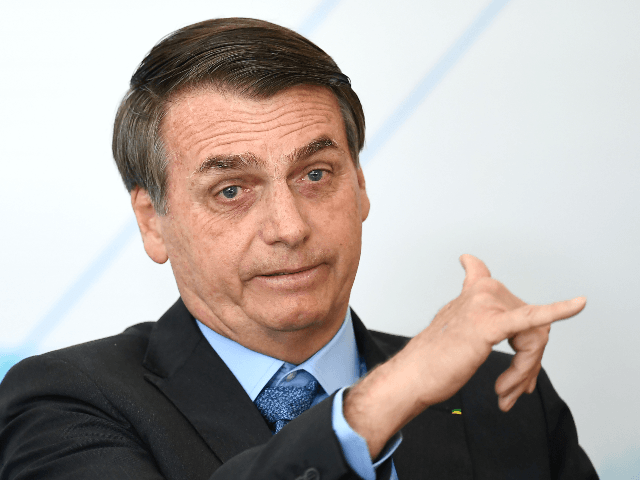Former Brazilian Justice Minister Sergio Moro told Time magazine in an interview Friday that he left the government of President Jair Bolsonaro because he did not feel it was doing enough to fight corruption.
Moro, until recently a judge in the regional capital Curitiba, rose to national prominence as the head of a corruption probe known as “Operation Car Wash.” The investigations Moro greenlit resulted in dozens of arrests of politicians of multiple parties, many participating in the same corruption scheme organized by presidents belonging to the socialist Workers’ Party (PT).
“Operation Car Wash” found extensive evidence of lawmakers and executive officials signing deals with government contractors, most prominently the disgraced corporation Odebrecht, in which the politicians would agree to pay the firms much more for infrastructure projects than they actually cost; the firm would distribute the remainder of the taxpayers’ dollars spent as a kickback in gratitude for the contract.
Moro’s investigations fueled the popular outrage that resulted in the impeachment and removal of President Dilma Rousseff and directly led to the imprisonment of her PT mentor and predecessor Luiz Inácio Lula da Silva. Bolsonaro appointed him Minister of Justice in recognition of his popular appeal.
The former judge abruptly resigned from his post in April amid controversy surrounding Bolsonaro’s response to the Chinese coronavirus pandemic and after suffering a barrage of attacks from the international left for his role in Lula’s removal from the political sphere. Moro noted that Bolsonaro fired the head of Brazil’s National Police, Mauricio Valeixo, and claimed the president attempted to remove the regional head of federal police in Rio de Janeiro while investigations were ongoing into the president’s sons.
Bolsonaro denied the accusation and claimed that Moro attempted a quid pro quo trade – to let Bolsonaro appoint National Police officers in exchange for a position on Brazil’s Supreme Court. He asserted that Moro was “committed to himself, to his own ego – not to Brazil” — and lamented that one time, in 2017, Moro “ignored” him at the airport.
The president also complained that the Federal Police were more interested in solving the mystery of the homicide of left-wing Rio councilor Marielle Franco than solving the case of his own attempted murder. Bolsonaro’s near-fatal stabbing was caught on video and the suspect immediately confessed to the crime; Franco’s case remains unsolved.
Moro denied any attempt at a trade for the Supreme Court seat. Adding to the intrigue around his resignation was also the fact that Moro’s signature appeared on the document that dismissed Valeixo of his job. Moro claimed that he never signed it.
Moro’s interview with Time represents the former judge’s most extensive remarks on the matter, particularly in English, since his resignation.
“It wasn’t my intention to damage the government, but I wouldn’t feel comfortable with my conscience without explaining why I was leaving,” Moro explained, adding that “a whole scenario that has unfolded over the last year […] that showed that this new government was not fulfilling its promises to fight corruption and strengthen institutions.”
Moro told Time that, in addition to the issue of Federal Police appointments, Bolsonaro allowing the Brazilian Congress to water down what was meant to be a firm anti-corruption bill also disappointed him.
“All of that began to strain, or drain of meaning, my remaining in the government. I can’t be in the government if I don’t have a serious commitment to corruption and rule of law,” the former judge said.
Time also asked Moro about Operation Car Wash and subsequent attempts to smear him. In 2019, the far-left outlet The Intercept began publishing transcripts of private messages from Moro’s phone that showed his investigations into Lula’s corruption had given him a negative opinion of the former president. The Intercept attempted to frame this as evidence that Moro’s role in the Lula case was not impartial, as would be required of a judge.
The report resulted in the arrests of several individuals, one of whom admitted to hacking into Moro’s phone. It also resulted in temporary charges against The Intercept’s Glenn Greenwald after evidence surfaced that Greenwald appeared to aid one of the suspects in hiding evidence. The charges against Greenwald have since been dropped.
“I have an absolutely clear conscience about what I did during Car Wash,” Moro told Time. “There’s an attempt to characterize everything as political persecution; to cast me as an executioner. It was never a personal issue with ex-president Lula either. Even though there’s a narrative that he wants to impose.”
Moro insisted, however, that he would not have joined as justice minister a government led by the PT.
“I simply wouldn’t believe that it would be possible [for them to advance the anti-corruption agenda], without recognizing past errors. So then you have to look for a fresh start. There has to be a serious commitment,” he said, adding, “Unfortunately, the government that was elected also didn’t have that.”

COMMENTS
Please let us know if you're having issues with commenting.